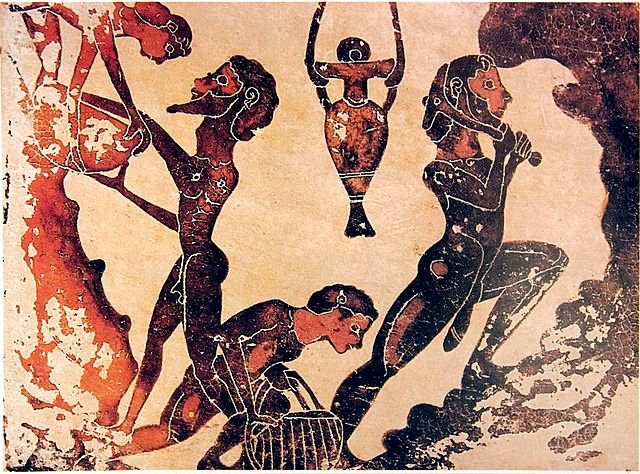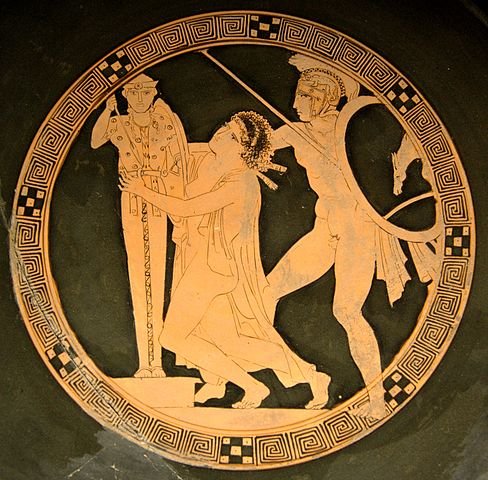
I’m picking up from where we left off yesterday – examining difficult moral issues from the Old Testament. This is the penultimate entry in my series on Christian anarchy.
If you’re new to the series, here are the links to the other articles:
- Can a Christian be an Anarchist?
- All Christians Should be Socialists
- What Does the Bible Actually Say About Government?
- Render to Caesar That Which is Caesar's
- Can a Christian be an Anarchist Without Rejecting Paul?
- What's Up With the Old Testament? i.
- What's Up With the Old Testament? ii.
Slavery in Israel

There were three types of slavery in the Old Testament. I'll attempt to address them all at least somewhat adequately while being as brief as possible.
1. Indentured Servitude (Debt Slavery)
In Israel and throughout the ancient Near East those in dire financial straights or in great debt were allowed to sell themselves into slavery, or more accurately servanthood since this was a somewhat voluntary arrangement.
If your brother, a Hebrew man or a Hebrew woman, is sold to you, he shall serve you six years, and in the seventh year you shall let him go free from you. 13 And when you let him go free from you, you shall not let him go empty-handed. 14 You shall furnish him liberally out of your flock, out of your threshing floor, and out of your winepress. As the Lord your God has blessed you, you shall give to him. 15 You shall remember that you were a slave in the land of Egypt, and the Lord your God redeemed you; therefore I command you this today. 16 But if he says to you, ‘I will not go out from you,’ because he loves you and your household, since he is well-off with you, 17 then you shall take an awl, and put it through his ear into the door, and he shall be your slave forever. And to your female slave you shall do the same. 18 It shall not seem hard to you when you let him go free from you, for at half the cost of a hired worker he has served you six years. So the Lord your God will bless you in all that you do.
Deuteronomy 15:12-18 (ESV)
Summary: Slaves (servants) were to be released from their contract after 6 years of labor. If the servant was happy with his master, he had the option to give himself as a permanent slave to that man. Verse 18 indicates that indentured servants were paid, but only half the wage of a regular worker. These standards applied to both male and female Israelite slaves.
2. Conjugal Slavery

The Bible lays out a couple of scenarios in which an Israelite male is allowed to purchase or capture a wife.
When a man sells his daughter as a slave, she shall not go out as the male slaves do. 8 If she does not please her master, who has designated her for himself, then he shall let her be redeemed. He shall have no right to sell her to a foreign people, since he has broken faith with her.
Exodus 21: 7-8 (ESV)
Summary: A man may sell his daughter to be betrothed to another man. If this new master is not pleased with his betrothed, he shall release her. He does not have the right to sell her into slavery to anyone else.
When you go out to war against your enemies, and the Lord your God gives them into your hand and you take them captive, 11 and you see among the captives a beautiful woman, and you desire to take her to be your wife, 12 and you bring her home to your house, she shall shave her head and pare her nails. 13 And she shall take off the clothes in which she was captured and shall remain in your house and lament her father and her mother a full month. After that you may go in to her and be her husband, and she shall be your wife. 14 But if you no longer delight in her, you shall let her go where she wants. But you shall not sell her for money, nor shall you treat her as a slave, since you have humiliated her.
Deuteronomy 21: 10-14 (ESV)
Summary: If you find a beautiful women among the captives of your enemies of war, you may take her as your wife. If she ceases to please you as she did when you first saw her, she is to be released. You do not have the right to sell her into slavery because you have humiliated her.
3. Prisoners of War

It was common in the ancient Near East for war captives to be forced into slavery. According to the book of Deuteronomy, this was a legitimate form of "forced servitude".
When you draw near to a city to fight against it, offer terms of peace to it. 11 And if it responds to you peaceably and it opens to you, then all the people who are found in it shall do forced labor for you and shall serve you.
Deuteronomy 20:10-11 (ESV)
Summary: If a city surrenders to your approaching army, its inhabitants shall be forced into slavery.
How are We to Deal With This?
First, I must concede that there were differences in the laws between the treatment of Israelite and foreign slaves/servants, but I really don't have the time to get into that in such a brief study.
Now, regarding indentured servants; this is pretty easy to dismiss as "not much of an issue" since the arrangement was contractual, not forced. Indentured servants were not property, their "owner" did not have total and absolute rights over them, and they weren't stripped of their identity (familial, social, marital, etc.) in any way. On top of that, Deuteronomy 18 reveals that the law's ultimate goal was no poverty and no servanthood. Paul Copan writes this in his book Is God a Moral Monster?:
This legislation commands the forgiveness of the poor person's (i.e., servant's) accumulated debt; this debt remission was to take place every seven years, which shows God's remarkable concern for the impoverished in the land.
...
The overriding, revolutionary goal expressed in this text is to totally eradicate debt-servanthood in the land: "there will be no poor [and therefore no debt servanthood] among you" (v. 4). Being a realist, however, God was aware that inferior conditions would exist and that poverty (and thus servanthood) would continue in the land (v. 11). Even so, this undesirable situation was to be battled rather than institutionalized.
The next two are more challenging since the passages definitely paint a picture of true slavery - where one person is owned by another.
Yes, these passages do condone slavery. But many of the cultural laws of Moses were more about making incremental steps toward perfection rather than achieving immediate perfection. In fact, we see these incremental adjustments (improvements) to the law from one end of the Old Testament to the other, and even within the Pentateuch itself.
Some of the slavery laws of Deuteronomy are less harsh than those in Exodus and Leviticus. Paul Copan writes:
These texts were deliberately kept together, in part to reflect the adjustment. Apparently, these tensions didn't seem all that wildly contradictory to the final editor of this portion of the Bible. This point serves to illustrate the "living, historical and contextual nature of the growth of Scripture."
And then by the time we reach the book of Amos, God is speaking harsh words against those who are buying the poor and needy with silver.
Changing a culture can be a long evolutionary process. And God is seen to be willing to make some concessions, even for things that he hates (like divorce in the Mosaic law, later improved upon by Jesus) if it will nudge the culture in the right direction. Slavery is no exception. Even in these examples we can see some value placed on the lives of the slaves. This was certainly an improvement over many of the ancient Near Eastern contemporaries.
Thank you for reading. Tomorrow I will post the final entry in this series. I'm running out of steam. I hope you can't tell from the writing.
~Seth
